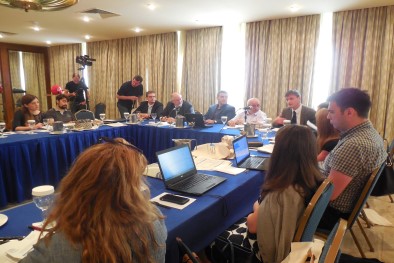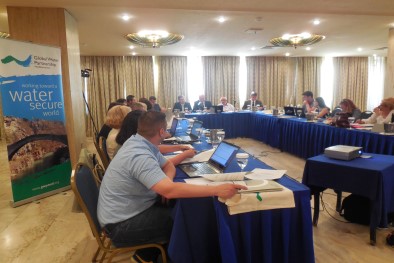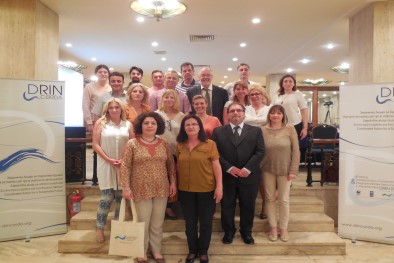The group of the 25 participants included Drin Core Group / Expert Working Groups[2] members, as well as Drin Riparians’[3] officials with competency in fields related to integrated basin management. The workshop aimed to build trainees’ capacities in the fields of international water law and transboundary environmental impact assessment.
The workshop, whose curriculum has been developed by the United Nations Economic Committee for Europe (UNECE), provided knowledge and enabled in-depth discussion among the participants on key legal obligations under international water law, and their application to specific areas of water cooperation, such as flood management and water quality protection. Moreover, it clarified the role of relevant UNECE and other Conventions, and explained their provisions in relation to cooperation mechanisms. Exercises were used to familiarise the participants with the application of international law in the planning of national activities in transboundary basins.

The team of trainers included:
- Dr. Stephen Stec, Adjunct Professor at the Central European University, that was the facilitator of the workshop and made presentations on international water law and relevant conventions: the Convention on the Protection and Use of Transboundary Watercourses and International Lakes (UNECE Water Convention) and the UN Convention on the Law of the Non-navigational Uses of International Watercourses (New-York Convention);
- Dr. Dejan Komatina, Secretary of the International Sava River Basin Commission, that spoke about the challenges met during the establishment and later on during the operation of the Commission, as well as about the practical benefits for the Sava countries through the implementation of the Framework Agreement on the Sava River Basin (FASRB);
- Mr. Nicholas Bonvoisin, Secretary to the Convention on the Transboundary Effects of Industrial Accidents (UNECE Industrial Accidents Convention), made a presentation on the said Convention and on the Convention on Environmental Impact Assessment in a Transboundary Context (UNECE Espoo Convention). He introduced also the participants to the recent experiences within the work programme of the UNECE Water Convention.

The group work that followed was related to the UNECE Espoo Convention. It included exercises on the establishment of new activities in a basin focusing on environmental impact assessment in a transboundary perspective. Finally, participants discussed future legal and institutional steps to take in the Drin basin in order to proceed from the Drin MoU and the Drin Core Group to achieving a basin agreement and the establishment of a Commission.
The empowerment of the institutions for the management of the Drin Basin is a key objective of the GEF Drin Project that aims to facilitate the Drin MoU[4] implementation and operationalize structured cooperation among the countries.
In fact, capacity building at national level with regards to crucial issues affecting transboundary water resources management is one of the key pillars of the project. In this sense, it assists in the sustainability of the wider project outcomes and results in strengthening the overall basin management architecture. A series of similar workshops for a number of target groups will follow throughout the project duration focusing on some or a combination of the following priority themes: land use management, integrated water resources management and Water Framework Directive implementation, environmental permits and management at local level, floods and droughts management, nature and ecosystems protection, pollution control, economic valuation of issues and solutions for basin management.
